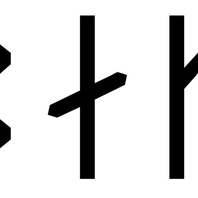
Viking Names
Bak
Bak is an original byname meaning ‘back’ and is not recorded as a given name in Scandinavia. It is the first element in the place-name Baston, Lincolnshire, and is also found as the first element of Baxby, in North Yorkshire.
Read More
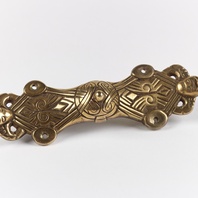
Viking Objects
Reproduction Equal-Armed Brooch
A reproduction of an equal-armed brooch in the Borre style found in Nottinghamshire. This style of brooch is known from Birka in Sweden, suggesting trade contacts or individuals from Birka arriving in the East Midlands. Brooches were a typical part of female dress. Scandinavian brooches came in a variety of sizes and shapes which included disc, trefoil, lozenge, equal-armed, and oval shapes. The different brooch types served a variety of functions in Scandinavian female dress with oval brooches typically being used as shoulder clasps for apron-type dresses and the rest being used to secure an outer garment to an inner shift. Anglo-Saxon brooches do not match this diversity of form with large disc brooches being typical of ninth century dress styles with smaller ones becoming more popular in the later ninth and tenth centuries. However, since disc brooches were used by both Anglo-Saxon and Scandinavian women they are distinguished by their morphology. Scandinavian brooches were typically domed with a hollow back while Anglo-Saxon brooches were usually flat. Moreover, Anglo-Saxon brooches were worn singly without accompanying accessories.
Read More
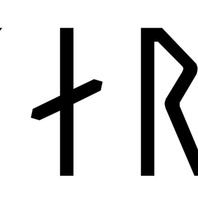
Viking Names
Sumarlidi
Sumarliði is originally a byname meaning ‘summer-traveller’. Although it has also been suggested that it is a variation on Vetrliði ‘a bear in its second year’, the close association of the name with the Viking diaspora supports the ‘summer-traveller’ meaning. These names likely arose in the Atlantic islands as there is one instance of Sumarliði from the early tenth century attributed to a man of Scottish birth, and several from the time of settlement in Iceland (c. 870-930). It does not appear until late in Norway, but there are several instances after c. 1320. The name is found in runic coin legends as the name of a moneyer operating in the Danish town of Lund between 1065 and 1075 – many of the moneyers in Lund actually came from England, where the name is relatively common. Sumarliði is also found in a place-name in Normandy. Sumarliði is the first element in three instances of the place-name Somerby, and one of Somersby, Lincolnshire, and the name is also frequently reported independently as a personal name in Domesday Book for Lincolnshire.
Read More
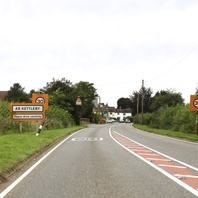
Viking Names
Ab Kettleby
Ab Kettleby, in the Framland Hundred of Leicestershire, comes from the Old Danish male personal name Ketil (Old Norse Ketill), originally a byname related to Old Norse ketill ‘a cauldron, a cauldron-shaped helmet’. This personal name was very common in England. It is compounded with Old Norse by ‘a farmstead, a village’. The affix Ab, which distinguishes the township from Eye Kettleby some four miles to the south, comes from the name of an early owner of the estate, a Middle English Abbe (either from the Old English male personal name Abba or the Old Norse male personal name Abbi).
Read More
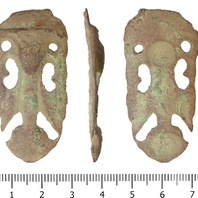
Viking Objects
Tongue-Shaped Strap-End (DENO-1268B3)
An incomplete, copper-alloy strap-end with anthropomorphic designs. These types of strap-ends were popular in both Scandinavia and on the Carolingian continent between the 9th and 10th centuries and were regularly used to embellish baldrics. Strap-ends came in various styles and were fairly common throughout the Viking world. They were used to decorate the ends of belts and to stop them getting damaged.
Read More
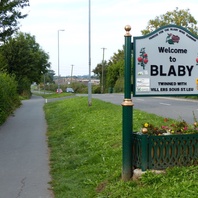
Viking Names
Blaby
Blaby, in the Guthlaxton Hundred of Leicestershire, likely comes from the unrecorded Old Norse male personal name Blár, which appears to be a byname from the Old Norse adjective blár ‘dark’, combined with the Old Norse element by ‘a farmstead, a village’.
Read More
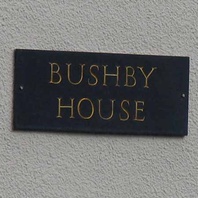
Viking Names
Bushby
The specific element of Bushby, in the Gartree Hundred of Leicestershire, is likely derived from the Old Norse male personal name Butr. Another Old Norse male personal name, Butsi, could also be formally accepted, and this personal name is found in the Danish place-names Busseby and Busserup. It has been suggested that the personal name became confused with Old English busc ‘bush’ or Old Norse buskr ‘shrub’, buski ‘shrubland’. This is a possibility because the neighbouring village Thurnby records a former area of thorn-scrub. The second element of the place-name is Old Norse by ‘a farmstead, a village’, thus Bushby could have the meaning ‘the farmstead of scrubland’ Bushby is now a joint parish with Thurnby.
Read More
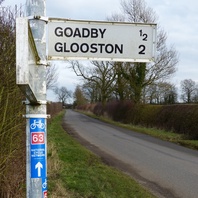
Viking Names
Goadby
The first element of Goadby, in the Gartree Hundred of Leicestershire, comes from the Old Norse male personal name Gauti (genitive singular Gauta), which is either a short form of names in Gaut- or is derived from an original byname meaning ‘a man from Gautland’. The second element of the place-name is Old Norse by ‘a farmstead, a village’. Occasionally the place-name is suffixed with reference to its neighbouring villages Noseley or Keythorpe to distinguish it from Goadby Marwood in the Framland Hundred.
Read More
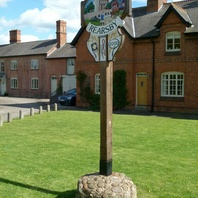
Viking Names
Rearsby
Rearsby, in the East Goscote Hundred of Leicestershire, comes from the Old Norse male personal name Hreiðarr and the Old Norse element by ‘farm, settlement’. The personal name here might be the same as that in Rotherby, Leicestershire.
Read More
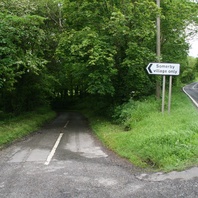
Viking Names
Somerby
Somerby, in the Yarborough Wapentake of Lincolnshire, probably comes from the Old Norse male personal name or byname Sumarliði and the Old Norse element by ‘farm, settlement’. The original byname means ‘the summer traveller’ and is recorded six times in Lincolnshire (all in Lindsey) in the Domesday Book. The spellings in Domesday parallel that of the place-name. Probably identical in origin is Somerby in Leicestershire. Alternatively, the name has been suggested to come from the Scandinavian compound sumar-hlíðar ‘summer slopes’, referring to pastures only used in the summers.
Read More
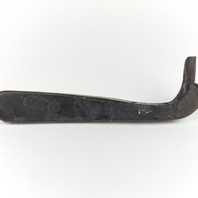
Viking Objects
Reproduction Iron Key
An iron key based on an original found in Grave 511 at Repton, Derbyshire. Iron keys were not only practical items but also symbols of status. Women were often given keys to the families chests of valuables. They also are often buried with keys, representing their authority in the household.
